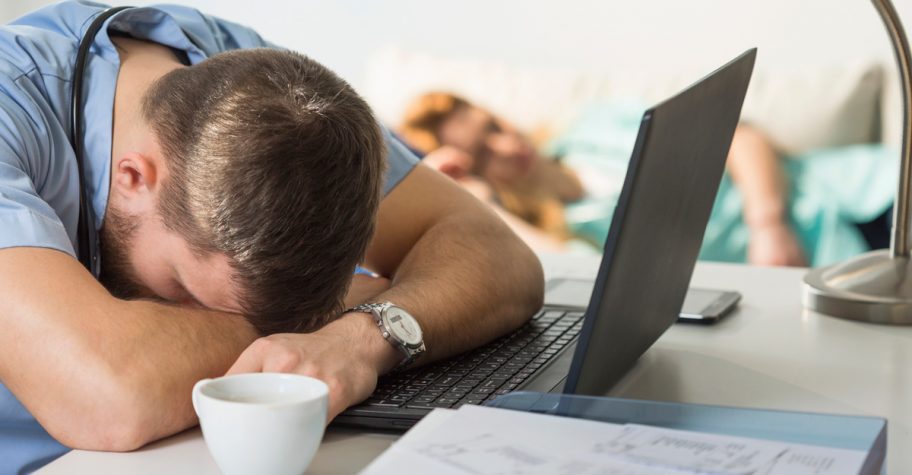Is someone taking care of your health?
Published June 2016

A case in point
The intern
It started so insidiously. I was in the middle of a general medical term, not enough hands to balance patient files with observation charts and patient lists. Medication charts that were never perfect, discharge summaries piling up, the never-ending beeps of my pager. Cover shifts that extended beyond finishing time and the post-take days, afraid to come in to work because the patient load would have doubled overnight, the ward round bound to take twice as long.
That was why I was tired all the time. If I finished early, it was to go home and sleep. If I had a rare moment of silence on the wards, I went to the doctor’s lounge and slept. Eight pm was my preferred bed time, and even then, I struggled to wake with my alarm. Breakfast was sacrificed for five, ten, fifteen minutes more sleep. I didn’t want to leave the house to buy groceries or visit friends. I didn’t have the energy to call or text friends. I had no energy so I stopped cooking. It was easier to eat pizza and curries that arrived on my doorstep.
I wasn’t depressed. I was just tired. I was overworked. I made excuses for my fatigue and my lack of motivation and my inertia. I made excuses for the low mood and inertia. I ignored the voice in my head that suggested reaching out as an option. Everyone else was coping. Everyone else was working harder and better. You’re attention seeking, narcissistic, nothing more.
That rotation ended. I moved to a different ward. Three days in, I was in theatre watching a case. My registrar asked me to chart antibiotics. I stepped too close to the anaesthetist and was promptly reprimanded. In hindsight, he wasn’t mean or rude or nasty. But tears sprung up in my eyes and I couldn’t make them go away. I tried mindfulness. I tried thinking about happy things. But five minutes later, I was out of the operating room, hiding in the women’s bathroom, trying to get myself together. I couldn’t think of a reason to cry, but I couldn’t stop crying.
I escaped the hospital and forced myself to see a family doctor for a medical certificate. She said the word depressed. She talked about medication and reviews and time off. That’s what happened. I took a week off. I slept most of it away. I told a colleague and a friend and they helped with food and driving and appointments and covering my shifts. I started being awake more, more motivated. Things gradually got better. I survived nine more weeks of theatre.
I’m in a much better place now.
Intern year is difficult, there is no doubt about that. It is exhausting at times. But please know that when bad days turn into weeks, there is help available. Know your warning signs. Know that when you start feeling like your symptoms match the DSM that you are allowed to reach out. Know that you are not weak or attention seeking or a failure. Don’t assume that everyone else is coping and that you should simply harden up.
You are not supposed to be infallible. You are human first, doctor second – there is no shame in asking for help.
Source: This blog was posted by a medical student in 2016 http://www.mylifeasamedstudent.tumblr.com/
Did you know?
One in five medical students and one in 10 doctors had suicidal thoughts in the past year1
As a group, 18 to 24 years olds deprived of sleep suffer more from impaired performance than older adults2
Tips
- Have your own GP and see them regularly
- Medical students need to be proactive in managing their health and well-being. Strategies for healthy living learnt early can follow you into medical practice
- Find a regular activity and walk, run or use the stairs whenever you can. Exercising releases endorphins in the brain and lifts your mood. Exercise also increases your energy level and helps you to get a good night sleep
- Having interests outside of medicine is critical to good mental health. Having musical, artistic or sporting interests is very invigorating mentally and academically
- Eat food that is healthy and nutritious and eat regularly
- Adequate water intake during the day is important as well as exposure to sunlight to maintain Vitamin D levels. Dehydration and low vitamin D levels are associated with fatigue and low mood
- Quality of sleep has a direct effect on your mental and physical health. Lack of, or poor sleep can cause irritability, reduced concentration, impaired memory, decreased hand-eye- co-ordination and can affect your ability to fight and endure sickness
- Look out for your colleagues. Students feeling overloaded or overwhelmed can fail to recognise symptoms and signs of impairment in themselves
- See if you can be part of opportunities to meet up with other students and to share your experiences of learning how to practice, and how you are coping
- Anticipating stressful times is important and putting in place additional support from your GP and a psychologist can be very useful
- Know where to receive support. You are not alone.
Resources
- Heads Up promoting the mental health of doctors and medical students
- Keeping your grass greener A wellbeing guide for medical students published by the Australian Medical Students Association (AMSA)
- R-Cubed Strategies to help medical students, prevocational doctors and general practice registrars become more resilient
- Health and wellbeing of junior doctors Self assessment tools, information and support for junior doctors provided by JMO Mental Health
- Australian Doctors’ Health Network Contact phone numbers for immediate help and support for doctors and students and for families and colleagues of doctors in Australia and New Zealand
- Doctors’ Health SA (DHSA) provides doctors for doctors. DHSA provides resiliency training for junior doctors
- ePhysicianHealth (Canada) also provides an online physician health and wellness resource, designed to build resilience
MIGA Resources at www.miga.com.au
- MIGA’s comprehensive health assessment checklist View article
- MIGA’s information for medical students View page
Contact us if you would like further information, advice or support.







